Water Data Forum
AI and the Water Workforce
November 7, 2024 | 11:00 a.m.–12:00 p.m. CT
Presented by the Cleveland Water Alliance (CWA), Midwest Big Data Innovation Hub (MBDH), and Water Environment Federation (WEF)
This forum will convene a cross-sector panel of experts to explore the current and future application and impact of AI to workforce issues in the water industry. In a facilitated discussion, the panelists will examine specific case studies and projects to define a vision for the impact and future of this unique application of water data.
Participants can expect to learn:
- 1. How is AI shaping hiring processes and workforce administration in the water and wastewater industries?
- 2. What role might AI play in addressing the “silver tsunami” and other workforce challenges in the water and wastewater industries?
- 3. What kind of workforce-related risks exist around the use of AI in the industry? How might current and future policies, systems, and procedures influence these risks?
Moderator:
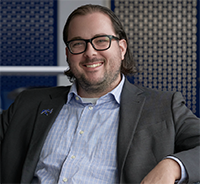
Max Herzog
Deputy Director of Programs and Partnerships | Cleveland Water Alliance
Max Herzog is an impact professional dedicated to engaging diverse stakeholders in the development of tools and strategies that drive community innovation and resilience at the regional level. Since 2016, he has worked at the nexus of intelligent water systems, technology-led economic development, and collaborative Great Lake management as a Program Manager with Cleveland Water Alliance. Max holds a BA degree from Oberlin College in Political Science and Environmental Studies.
Panelists:
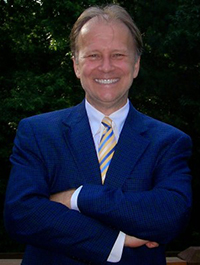
Robert Bornhofen
Director of Innovation | DC Water
As the Innovation Leader for DC Water, Dr. Robert Bornhofen is tasked with formulating and executing a comprehensive strategy across the entire organization. As an academic, Dr. Robert teaches innovation strategy at Cornell University. He also teaches the MBA Capstone course at the University of Maryland. His past industry experience includes such well-known companies as IBM, Citibank, and Delta Air Lines. Robert holds two U.S. Patents for original and patentable technologies.
Experienced in leading change initiatives, Robert embraces the creative spirit that goes into innovation, where smart people come together to address key challenges, where great ideas get transformed into extraordinary outcomes. His niche is helping organizational leaders formulate and execute strategy.
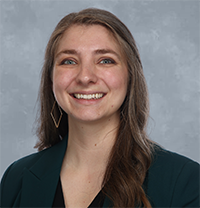
Miriam Hacker
Research Program Manager | The Water Research Foundation
Dr. Miriam Hacker serves as a Research Program Manager at the Water Research Foundation, building bridges between research and practice. Her research portfolio through the Foundation focuses on projects related to Utility Management, Workforce Management, Water Reuse, and Decentralized Systems. Dr. Hacker earned her BS, MS, and PhD degrees in Civil Engineering at the University of Washington, with an emphasis in construction, energy, and sustainable infrastructure. Her professional experience includes local permitting, stormwater management, network development, and the housing-water nexus. More recent research experience includes institutional and governance considerations for implementation of alternative water systems (e.g., on-site water reuse, general water reuse) and community engagement best practices.
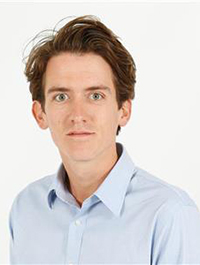
Joe Shuttleworth
Digital Lead—Water | Arup
Joe is Arup’s Digital Water Leader for America. He is passionate about the role technology plays in shaping sustainable and resilient environments. With a digital-first approach, he aims to address critical issues relating to resilience, flood risk, water supply, and wastewater treatment. He works nationally and internationally with water utilities, environment-management authorities, and governments to realize the potential for digital to tackle these.
Water Data Forum
Cybersecurity in Water: Protecting Your Data—A Discussion With CISA
September 5, 2024 | 11:00 a.m.–12:00 p.m. CT
Presented by the Cleveland Water Alliance (CWA), Midwest Big Data Innovation Hub (MBDH), and Water Environment Federation (WEF)
The Water Environment Federation and the Cybersecurity and Infrastructure Security Agency (CISA) will lead a conversation on the resources and availability of tools to aid in protecting data. A curated panel discussion with a CISA expert will be followed by Q&A.
Participants can expect to learn:
- 1. Examples of control measures to protect data during a time of significant innovation in areas such artificial intelligence (AI) and machine learning (ML).
- 2. Overcoming cybersecurity challenges in information technology (IT) and operational technology (OT) projects.
- 3. Guidelines and resources for managing risk.
Moderator:
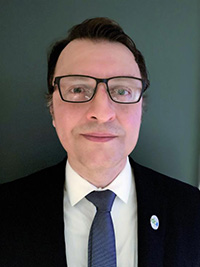
Elkin Hernandez
Director, Maintenance Services | DC Water
Past Chair of Intelligent Water Technology Committee | WEF
Mr. Elkin Hernandez currently serves as DC Water Director of Maintenance Services. In this role, he oversees the maintenance of the over 40,000 assets used at Blue Plains Advanced Wastewater Treatment Plant (AWTP). He has over 20 years of experience in the design, construction, commissioning, and maintenance of water treatment and power utilities. For the past 9 years, he has worked at DC Water Blue Plains AWTP. Prior to joining DC Water, he worked in the consulting and construction engineering fields as a design, development, and commissioning engineer and manager.
Mr. Hernandez is the immediate past chair of the WEF Intelligent Water Technology Committee. His background includes work on telecom cation, automation, process control, and cybersecurity. Currently, his work is focused in the fields of smart water, management, and maintenance optimization. Mr. Hernandez holds a bachelor and a master of engineering degree in Electrical and Computer Science.
Panelists:
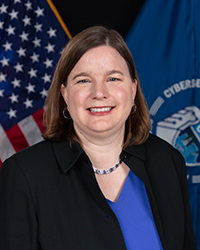
Lauren Wisniewski
Water and Wastewater Sector Liaison | Cybersecurity and Infrastructure Security Agency (CISA)
As CISA’s Water and Wastewater Sector Liaison, Ms. Wisniewski is the nexus for CISA’s Water and Wastewater Sector efforts. She partners with the Environmental Protection Agency (EPA), the Sector Risk Management Agency, as well as private and public stakeholders in the Water and Wastewater Sector. In addition to supporting water efforts across CISA, Ms. Wisniewski, as CISA’s representative on the Water Government Coordinating Council, works with EPA and other government partners as well as the Water Sector Coordinating Council to address sector priorities and increase the resilience of our nation’s critical water infrastructure.
Prior to joining CISA, Ms. Wisniewski served as an environmental engineer in the EPA Office of Water for over 20 years. For most of her EPA career, she worked on a variety of efforts to increase the resilience of the water sector and address key water sector interdependencies. She led over 40 locally customized workshops and exercises across the country for drinking water and wastewater utilities on resilience, infrastructure protection, and coordination with other critical infrastructure sectors including energy, emergency services, and food and agriculture. She developed numerous EPA publications, including EPA’s Power Resilience Guide for Water and Wastewater Utilities. She also staffed the Water Desk in EPA’s Emergency Operation Center (EOC) during several activations and served as a Watch Officer in the EOC. During her tenure at EPA, Ms. Wisniewski received two EPA Gold Medal Awards for Exceptional Service and two EPA Bronze Medal Awards for Commendable Service.
Ms. Wisniewski has a bachelor of science degree in engineering, summa cum laude, in Civil Engineering from Duke University and served as the Engineering Student Government President her senior year. Additionally, she has a Master of Public Health degree from The George Washington University.
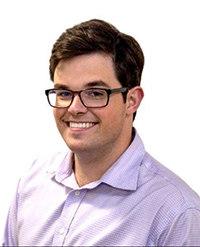
Matthew Rogers
ICS Cybersecurity Expert, Office of the Technical Director | Future Technologies Branch at CISA
Matthew Rogers, PhD, is an Industrial Control Systems (ICS) Cybersecurity Expert in the Office of the Technical Director at the Cybersecurity and Infrastructure Security Agency (CISA) and the lead for the Secure by Design initiative for Operational Technology (OT). He received his PhD in securing legacy OT networks in vehicles from the University of Oxford on a Rhodes Scholarship. Matthew worked as the founding engineer at a vehicle and weapon’s system cybersecurity startup before pursuing broader ICS cybersecurity efforts at MITRE. Matthew’s focus at CISA is on how ICS Research & Development efforts can be transitioned to effective tools for Critical Infrastructure sectors.
Water Data Forum
Catching the Unseen: AI’s Role in Tackling Microplastic Pollution
April 16, 2024 | 11:00 a.m.–12:00 p.m. CT
Presented by the Cleveland Water Alliance (CWA), Midwest Big Data Innovation Hub (MBDH), and Water Environment Federation (WEF)
The Midwest Big Data Innovation Hub leads a conversation on AI’s role in addressing microplastics in waterways. A curated panel discussion with experts in environmental toxicology, microplastics research, and artificial intelligence applications for environmental solutions will be followed by Q&A.
Participants can expect to learn:
- 1. The Who, What, Where, When, Why, and How of microplastic pollution.
- 2. How data is leveraged to study and impact microplastic pollution.
- 3. The future of AI’s role in tackling microplastic pollution.
Moderator:
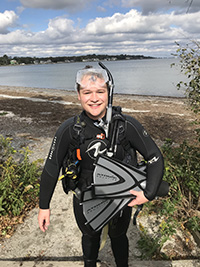
Alexander Tompkins
CEO | Remedion
Alexander Tompkins serves as the Chief Executive Officer of Remedion, a clean-tech company dedicated to providing pollutant-free alternative food and water products. Remedion is currently launching a pollutant-free bottled water line and spearheading a number of initiatives to remove microplastics from consumables. Additional information is available here.
Panelists:
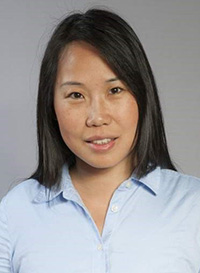
Dr. Yongli Zhang Wager
Associate Professor | Wayne State University
Dr. Yongli Wager is an Associate Professor in the Department of Civil and Environmental Engineering at Wayne State University. Her research focuses on water treatment and water quality that has been funded by NSF, EPA, NIEHS, DOE, Microsoft, Great Lakes Protection Fund, and Great Lakes Water Authority. Her group’s microplastic research includes understanding the fate and transport of microplastics in natural and engineered water systems, developing high-throughput microplastics sensing technologies, developing data tools to identify sources and pathways of waste plastics entering into the environment, and conducting community outreach campaigns to reduce plastic pollution.
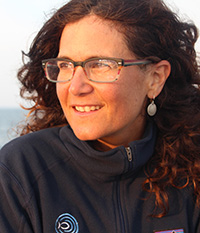
Rachael Miller
Founder | Cora Ball
Founder | Rozalia Project for a Clean Ocean
Rachael Zoe Miller, National Geographic Explorer and co-inventor/CEO of Cora Ball, leads the Rozalia Project for a Clean Ocean, aiming to tackle marine debris through cleanup and innovative solutions. With a focus on microplastic research, her expeditions range from the Hudson River to the Arctic, contributing to significant scientific findings. Rachael’s work has earned her global recognition, including speaking engagements at TEDx and the NatGeo Explorers Festival. An experienced sailor and underwater robotics trainer, she’s passionate about mentoring young scientists and engaging in water sports, finding inspiration in both snow and sea.
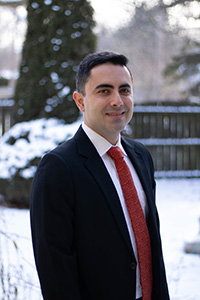
Dr. Andrés Prada
Assistant Research Scientist | Illinois Sustainable Technology Center
Andrés Prada, PhD, EIT, is a dynamic professional based in Champaign, Illinois, with extensive experience in data analytics and environmental research. Currently, he applies his expertise at FrostDefense EnviroTech, Inc., developing predictive tools and machine-learning models to optimize agricultural products’ application, significantly reducing uncertainty and enhancing effectiveness. At the Prairie Research Institute, he excels as an Assistant Research Scientist, leading initiatives on per- and polyfluoroalkyl substances (PFAS) and microplastics mitigation, securing substantial funding, and contributing to impactful collaborations. Prada’s academic background includes a PhD in Civil Engineering from the University of Illinois at Urbana-Champaign, with a strong publication record, showcasing his commitment to environmental solutions and advanced data analysis.
Water Data Forum
Toward a Resilient Water Future: Managing the Impacts of a Changing Climate on Community Infrastructure
November 8, 2023 | 11:00 a.m.–12:00 p.m. CT
Presented by the Cleveland Water Alliance (CWA), Midwest Big Data Innovation Hub (MBDH), and Water Environment Federation (WEF)
The Midwest Big Data Innovation Hub leads a conversation on climate resilience for water infrastructure. A curated panel discussion with subject matter experts will be followed by Q&A.
Participants can expect to learn:
- 1. What climate resilience means in the context of community water systems.
- 2. How data and analytics can be used to support decision making around climate resilience.
- 3. What new trends and technologies are emerging to address climate resilience for water systems.
Moderator:

W. John MacMullen
Executive Director | Midwest Big Data Innovation Hub
W. John MacMullen is the Executive Director of the Midwest Big Data Innovation Hub (MBDH), part of the national network of NSF-funded regional Big Data Innovation Hubs. MBDH is led from the University of Illinois at Urbana-Champaign (UIUC), within the National Center for Supercomputing Applications (NCSA). John is a social scientist and former faculty member in the School of Information Sciences at UIUC, where his research and teaching focused on bioinformatics and data curation practices in model organism databases.
Panelists:
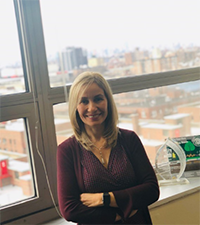
Pinar Balci
Assistant Commissioner | Bureau of Environmental Planning & Analysis, New York City Department of Environmental Protection
Pinar Balci is the Assistant Commissioner of the Environmental Planning and Analysis at the New York City (NYC) Department of Environmental Protection (DEP). She manages many of DEP’s sustainability initiatives, including the NYC Green Infrastructure Program, citywide Municipal Separate Storm Sewer System (MS4) Stormwater Management Program, Demand Management Program, and Climate Resiliency and Wetland Restoration. She provides technical and policy support to DEP’s Combined Sewer Overflow (CSO) Long-Term Control Plans and oversees Environmental Impacts Assessments of DEP’s Capital Program. She also leads efforts related to protection of Jamaica Bay and planning for new growth stimulated by rezoning throughout the city. Prior to joining NYC DEP, Pinar held multiple management positions at the South Florida Water Management District, where she was responsible for planning and providing policy and permitting oversight to an array of Everglades Restoration and Capital Projects.
Dr. Balci has published multiple manuscripts regarding ecosystem restoration and water resource planning in journals and provided peer reviews of manuscripts on behalf of professional journals.
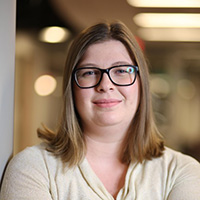
Geneva Gray, PhD
Physical Scientist, Office of Ground Water and Drinking Water | U.S. Environmental Protection Agency (EPA)
Geneva Gray is a Physical Scientist in the Office of Ground Water and Drinking Water at the Environmental Protection Agency. As a doctoral student, she was named the Oak Ridge Institute for Science and Education (ORISE) Future of Science Graduate Student and Post-Master’s Award winner in 2022. She studied how extreme precipitation events change under future warming conditions using stakeholder-driven case studies and extreme value analysis. Gray holds two BS degrees in Meteorology and Environmental Sciences, and an MS degree (studying quantitative methods on climate model ensemble selection) and PhD in Atmospheric Sciences and Meteorology, all from North Carolina State University.
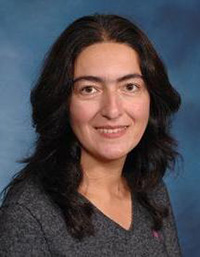
Lilit Yeghiazarian
Professor of Chemical and Environmental Engineering | University of Cincinnati
Dr. Yeghiazarian is a Professor of Chemical and Environmental Engineering at the University of Cincinnati. She holds degrees in Electrical and Industrial Engineering from the Polytechnic Institute and the American University of Armenia. Dr. Yeghiazarian obtained her PhD from the Cornell University Department of Biological and Environmental Engineering for her work on microbial dynamics in complex environmental systems. She studied active polymer materials at the Cornell University Department of Materials Science and Engineering as a postdoctoral fellow.
Dr. Yeghiazarian is a recipient of numerous awards, including a Faculty Early Career Development Program (CAREER) award from the National Science Foundation (NSF), a Ruth L. Kirschstein award from the National Institutes of Health (NIH), an InterPore Rosette Award from the International Society for Porous Media, and an NSF Convergence Accelerator award on Urban Flooding. Her research portfolio covers topics ranging from watershed processes, sustainability, and environmental sensing to porous media and multifunctional materials.
Water Data Forum
The Digital Twin Readiness Guide—The Path to Implementation
September 12, 2023 | 12:00–1:00 p.m. CT
Presented by the Cleveland Water Alliance (CWA), Midwest Big Data Innovation Hub (MBDH), and Water Environment Federation (WEF)
Digital Twins is one of the most transformative technologies enabling utilities to make the most of their digital investments. As a recent innovation, Digital Twin technology can be complex and confusing, with utilities wondering how best to implement this technology.
This webcast will discuss the SWAN Digital Twin Readiness Guide and highlight a Collection System Digital Twin case study. This Digital Twin Readiness Guide provides a much-needed consolidated resource for utilities to reference as they upgrade and expand their operational systems.
Moderator:

Elkin Hernandez
Director, Maintenance Services | DC Water
Past Chair of Intelligent Water Technology Committee | WEF
Mr. Elkin Hernandez currently serves as DC Water Director of Maintenance Services. In this role, he oversees the maintenance of the over 40,000 assets used at Blue Plains Advanced Wastewater Treatment Plant (AWTP). He has over 20 years of experience in the design, construction, commissioning, and maintenance of water treatment and power utilities. For the past 9 years, he has worked at DC Water Blue Plains AWTP. Prior to joining DC Water, he worked in the consulting and construction engineering fields as a design, development, and commissioning engineer and manager.
Mr. Hernandez is the immediate past chair of the WEF Intelligent Water Technology Committee. His background includes work on telecom cation, automation, process control, and cybersecurity. Currently, his work is focused in the fields of smart water, management, and maintenance optimization. Mr. Hernandez holds a bachelor and a master of engineering degree in Electrical and Computer Science.
Panelists:
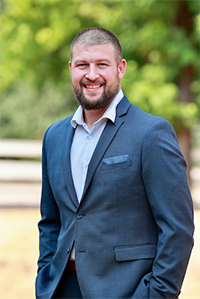
Mike Karl
VP, Global Digital Leader, Global Water Business Line | AECOM
Chair | SWAN Americas Alliance
Michael Karl serves as the VP, Global Digital Leader for AECOM’s Global Water Business Line. With over two decades of experience, he steers the digital transformation initiatives within AECOM’s water sector. His specialty lies in harnessing digitally enabled solutions to boost organizational efficiency, underscored by his deep expertise in Smart Water, automation, Digital Twins, and advanced analytics. A recognized industry leader, Michael chairs the SWAN Americas Alliance and has previously co-chaired the SWAN Digital Twin Holistic Architecture Committee. Consistently at the forefront of digital innovation, Michael is unwavering in his dedication to propel the water industry’s digital evolution.

Dr. Pusker Regmi, PhD
Wastewater Innovation Expert | Brown and Caldwell
Dr. Pusker Regmi is a wastewater innovation leader at Brown and Caldwell. He is a board-certified environmental engineer, named 40 Under 40 awardee in 2022 by The American Academy of Environmental Engineers & Scientists. Pusker is credited with pioneering advanced biological nutrient-removal technologies. He is the author of over 50 peer-reviewed publications and has served as principal investigator for multiple Water Research Foundation projects. He is currently a vice-chair of the WEF Research and Innovation symposium and vice-chair of WEF Research and Innovation for Strengthening Engagement (RISE).
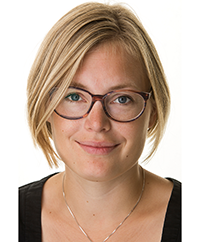
Dr. Agnethe Nedergaard Pedersen, PhD
Digital Twin Lead | VandCenter Syd (Denmark)
Dr. Agnethe Nedergaard Pedersen is a Digital Twin Lead at VCS Denmark—a utility company in Denmark. She has done research on the reliability of digital twins, especially within the application of simulation models. She is on the Steering Committee in the SWAN Interoperable Utility Group, where utilities come together to set a direction for the digitalization of the water sector.
Water Data Forum
Wastewater Surveillance for Public Health
June 16, 2023 | 12:00–1:00 p.m. CT
Presented by the Cleveland Water Alliance (CWA), Midwest Big Data Innovation Hub (MBDH), and Water Environment Federation (WEF)
This forum will convene industry, government, and research experts to explore the current and future application of wastewater surveillance to issues of public health. In a facilitated discussion, the panelists will examine specific case studies and projects to define a vision for the impact and future of this unique mode of water data.
Participants can expect to learn:
- 1. How does wastewater surveillance help us understand the source & spread of disease?
- 2. What implications does this technology have for management of COVID-19 and future pandemics?
- 3. What kind of risks or protections exist around the possibility of revealing peoples’ individual health information using this technology?
Moderator:
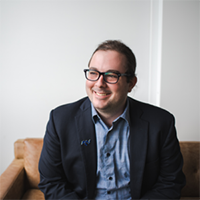
Max Herzog
Program Manager | Cleveland Water Alliance
Max Herzog is an impact professional dedicated to engaging diverse stakeholders in the development of tools and strategies that drive community innovation and resilience at the regional level. He is currently working at the nexus of intelligent water systems, technology-led economic development and Great Lake management as a Program Manager with Cleveland Water Alliance. Max holds a BA degree from Oberlin College in Political Science and Environmental Studies.
Panelists:
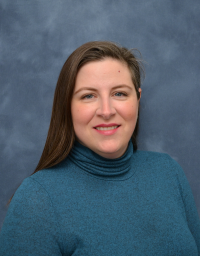
Amy Kirby
National Wastewater Surveillance System Lead | Centers for Disease Control and Prevention (CDC)
Dr. Amy Kirby is an Environmental Microbiologist in the Waterborne Disease Prevention Branch and the Program Lead for the National Wastewater Surveillance System (NWSS) at the Centers for Disease Control and Prevention (CDC). She has a Bachelor of Science degree in Agriculture from the University of Georgia; a PhD in Microbiology from the University at Buffalo, SUNY; and a Master of Public Health degree in Epidemiology from Emory University. At CDC, Dr. Kirby is interested in leveraging environmental microbiology methods to measure pathogens, antibiotic resistance genes, and other health indicators in natural and man-made water systems.
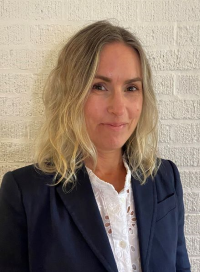
Anna Mehrotra
Wastewater Surveillance Program Director | Water Environment Federation (WEF)
Anna Mehrotra, PhD, PE is a wastewater specialist with nearly 20 years of wastewater experience as an engineer, researcher, policy analyst, and teacher. She is a licensed Professional Engineer (PE) with an MS degree in Environmental Engineering and Science from Stanford University; a PhD in Civil/Environmental Engineering from the University of California, Berkeley; and substantial practical knowledge gained from implementing a wide variety of wastewater treatment design and wastewater surveillance projects. Anna is currently the Director for the Water Environment Federation Wastewater Surveillance Program. She oversees training, collaborations, pilot testing, and other activities focused on strengthening relationships between wastewater utilities and public health entities, advancing the practice of wastewater surveillance, and expanding participation in the Centers for Disease Control and Prevention (CDC) National Wastewater Surveillance System.
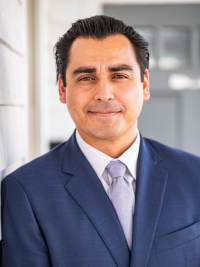
Raul Gonzalez
Environmental Scientist | Hampton Roads Sanitation District (HRSD)
Raul Gonzalez is an Environmental Scientist at Hampton Roads Sanitation District (HRSD). He runs the HRSD Molecular Pathogen Program, which comprises a molecular lab and field scientists. His group applies molecular methods to man-made infrastructure and their adjacent waters. Current projects use nucleic acid-based markers for a variety of applications, including identifying compromised sewer infrastructure and quantifying pathogen removal of various treatment trains. He is a native of California, where he graduated from the University of California, Los Angeles (UCLA) with a degree in biology. After graduation, Raul worked at the Los Angeles County Sanitation Districts before returning to graduate school at the University of North Carolina at Chapel Hill, where he earned his PhD in Environmental Science and Engineering. More recently, he studied Bioinformatics at Johns Hopkins University.
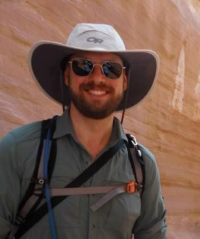
Nathan LaCross
Wastewater Surveillance Program Manager | Utah Department of Health and Human Services
Nathan manages the Wastewater Surveillance Program at the Utah Department of Health. He received a Master of Public Health degree in 2006 and a Doctorate in Epidemiology in 2011, both from the University of Michigan. He first joined the Utah Department of Health in 2013, working with the Environmental Epidemiology Program on environmental health issues and assessment in Utah. Since March of 2020, he has been working on COVID-19 surveillance and assisting the state’s pandemic response. Nathan has been involved with Utah’s wastewater surveillance efforts from their beginning in the spring of 2020, and strives to continually build and enhance the program.
Water Data Forum
Cybersecurity & Interoperability
March 9, 2023 | 12:00–1:00 p.m. CT
Presented by the Cleveland Water Alliance (CWA), Midwest Big Data Innovation Hub (MBDH), and Water Environment Federation (WEF)
The Water Environment Federation and Virginia Tech Sustainable Water Infrastructure Management (VT SWIM) will lead a conversation on the intersection of interoperability and cybersecurity as it relates to data integration in water infrastructure asset management. A curated panel discussion with experts in the field will be followed by Q&A.
Participants can expect to learn:
- 1. Examples of gathering data to inform business intelligence systems while maintaining a high level of cybersecurity.
- 2. Overcoming cybersecurity challenges in IT and OT projects that involve interoperability of systems and applications.
- 3. Guidelines and resources for managing risk.
Moderator:

Elkin Hernandez
Director, Maintenance Services | DC Water
Member | WEF Intelligent Water Technology Committee
Mr. Elkin Hernandez currently serves as DC Water Director of Maintenance Services. In this role, he oversees the maintenance of the over 40,000 assets used at Blue Plains Advanced Wastewater Treatment Plant (AWTP). He has over 20 years of experience in the design, construction, commissioning, and maintenance of water treatment and power utilities. For the past 9 years, he has worked at DC Water Blue Plains AWTP. Prior to joining DC Water, he worked in the consulting and construction engineering fields as a design, development, and commissioning engineer and manager.
Mr. Hernandez is the immediate past chair of the WEF Intelligent Water Technology Committee. His background includes work on telecom cation, automation, process control, and cybersecurity. Currently, his work is focused in the fields of smart water, management, and maintenance optimization. Mr. Hernandez holds a bachelor and a master of engineering degree in Electrical and Computer Science.
Panelists:
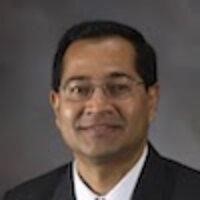
Dr. Sunil Sinha
Professor and Director of Sustainable Water Infrastructure Management (SWIM) Center | Virginia Tech
Dr. Sunil Sinha is a Professor of Civil and Environmental Engineering and Director of Sustainable Water Infrastructure Management (SWIM) Center of Excellence at Virginia Tech. Dr. Sunil Sinha is a National Science Foundation (NSF) Career Award recipient in the area of sustainable water infrastructure management systems.
Dr. Sinha’s research, teaching, and consulting activities are focused in the areas of infrastructure management, sustainability, pattern recognition, sensor informatics, and resilience, especially water systems. Dr. Sinha has documented and disseminated the results and findings from research in over 450 publications in refereed journals and reports.
Dr. Sinha was featured in a 90-minute PBS documentary titled “Liquid Assets: The Story of Our Water Infrastructure,” which throws light on a long-buried problem—America’s aging water system. He has given many NPR interviews and was featured as a water infrastructure expert in a History Channel documentary titled “The Crumbling of America.”
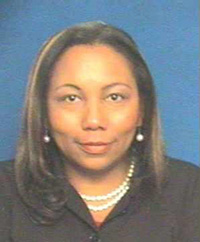
Zonetta E. English
Strategic Initiatives and Project Delivery Director | Louisville and Jefferson County Metropolitan Sewer District
Ms. Zonetta English is the Strategic Initiatives and Project Delivery Director for the Louisville and Jefferson County Metropolitan Sewer District (MSD). Ms. English has 30 years of experience in the wastewater industry in various capacities: Laboratory Management and Certification, Operations Support, Research and Capital Project Management. She was one of 20 professionals from across five disciplines: Chemists, Wastewater, Industry Experts, State Regulators, and Environmentalists, who was selected by the US EPA Office of Water to serve on the Federal Advisory Committee for Detection and Quantitation to propose a new Method Detection Limit (MDL) procedure for 40 CFR Part 136 Appendix B.
Currently, Ms. English leads research for new processes and advanced technologies that will enhance any aspect of MSD (i.e., wastewater, stormwater, etc.) as assigned by Executive Leadership. She develops and oversees the development of complex technical reports; presents findings and recommendations to the MSD Board, senior staff, community, and technical peer groups; provides direction for strategic initiatives (i.e., biosolids, artificial intelligence, capital funding sources, etc.) in the way of research, historical knowledge, technical support, financial analysis, and project delivery; develops and directs strategic partnerships with the Water Research Foundation (i.e., LIFT), universities, utility partners and global technology approval organizations (such as Isle, Inc.); works with the executive team and operations leadership to interpret regulatory obligations and to develop strategies to address new requirements; develops and maintains processes and procedures consistent with best practices, and federal, state, and local laws; and provides 24-hour emergency response to assist Senior Leadership to resolve environmental issues and emerging contaminants of concern.
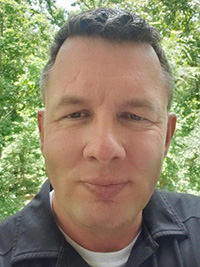
Michael Thompson
Critical Infrastructure & ICS Cyber Outcome Lead | The MITRE Corporation
Michael Thompson is a Critical Infrastructure & ICS Cyber Outcome Lead at The MITRE Corporation. Michael joined MITRE in 2021 after spending more than 25 years in the process control, functional safety engineering, and industrial control system cybersecurity fields. Michael has deep knowledge and experience in the chemical, nuclear, water, and oil and gas industries. He holds a bachelor’s degree in Information Systems Science from the University of Maryland and a master’s degree in Systems Engineering from Johns Hopkins University.
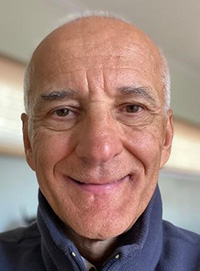
Dr. Zdenko (Cello) Vitasovic
Principal Investigator | WRF 4806 Project (UAIM)
Co-Principal Investigator | WRF Project 5039 (Smart Utilities and Intelligent Water Systems)
Past Chair | WEF Intelligent Water Systems Committee
Recipient | WEF Harrison Prescott Eddy Medal for outstanding Research (1998)
Project Team Lead | WEF WISE Program
Cello’s focus has been on mathematical modeling, operational technology and real-time controls, and information systems. He has executed a number of projects for water sector utilities in North America, UK, China, Hong Kong, Singapore, and Australia.
Water Data Forum
Smart Water Equity: Data-Enabled Affordability and Justice
November 9, 2022 | 9:00–10:00 a.m. CT
Presented by the Cleveland Water Alliance (CWA), Midwest Big Data Innovation Hub (MBDH), and Water Environment Federation (WEF)
This forum will convene industry and community experts to explore the current and future application of water data tools to issues of water equity and environmental justice. In a facilitated discussion, the panelists will examine specific case studies and projects to define a vision for the impact and future of data in this space.
Participants can expect to learn:
- 1. Why the price of water is on the minds of families across North America.
- 2. How water quality issues are often environmental justice issues.
- 3. The appropriate role of technology and data in addressing systemic challenges.
Moderator:

Max Herzog
Program Manager | Cleveland Water Alliance
Max Herzog is an impact professional dedicated to engaging diverse stakeholders in the development of tools and strategies that drive community innovation and resilience at the regional level. He is currently working at the nexus of intelligent water systems, technology-led economic development and Great Lake management as a Program Manager with Cleveland Water Alliance. Max holds a BA degree from Oberlin College in Political Science and Environmental Studies.
Panelists:
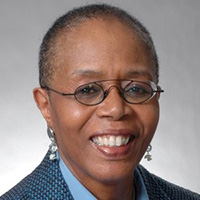
Constance Haqq
Chief Administrative Officer | Northeast Ohio Regional Sewer District
Ms. Haqq joined the Northeast Ohio Regional Sewer District in 2005 as Director of Communications and Community Relations. She currently serves as Chief Administrative Officer and is responsible for the organization’s internal and external communications, public outreach and education, media relations, customer service, and government affairs functions. Ms. Haqq has held several leadership positions in her career, including Executive Director of both INROADS/Northeast Ohio, Inc. and the Nordson Corporation Foundation. A native of Cleveland, Ohio, she holds a bachelor’s degree from Tufts University and a master’s degree from Case Western Reserve University’s Mandel School of Applied Social Science. She has served on numerous philanthropic boards, including: Ohio Boys Town, Inc.; Karamu House, Inc.; Rainbow Babies and Children’s Hospital; and Business Volunteers Unlimited. Ms. Haqq currently represents the Northeast Ohio Regional Sewer District on the Commission for Economic Inclusion’s leadership committee.
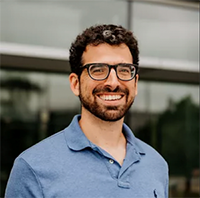
Ian Robinson
President & COO | BlueConduit
Ian Robinson is the President and Chief Operating Officer of BlueConduit. He manages day-to-day operations and strategic decision-making. He coauthored a white paper on data science for lead service line (LSL) replacement with the Association of State Drinking Water Administrators (ASDWA) and is the vice chair for the American Water Works Association (AWWA) Lead in Water Subcommittee. He graduated from the University of Michigan Ross School of Business and School of Natural Resources and Environment with an MBA/MS degree. He excels at human-centered design, stakeholder engagement, and business strategy. He has extensive experience working with community-based initiatives. He served as a Peace Corps Volunteer in Ecuador from 2009–2012.
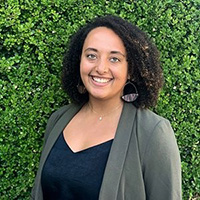
Letitia Carpenter
Senior Program Manager | US Water Alliance
Letitia Carpenter is a Senior Program Manager at the US Water Alliance, a national nonprofit organization advancing policies and programs that build a sustainable water future for all. She works on the Alliance’s Equitable Water Future programs and has years of experience in network management, advancing environmental justice, equity, and community-centered practices. Before joining the Alliance, Letitia worked on community-centered environmental justice initiatives in both the nonprofit and public sectors to ensure equitable access to environmental and community benefits.
Water Data Forum
Water Education: STEM, Youth Empowerment, and Workforce Development
September 19, 2022 | 12:00–1:00 p.m. CT
Presented by the Cleveland Water Alliance (CWA), Midwest Big Data Innovation Hub (MBDH), and Water Environment Federation (WEF)
Julianne Jones, WEF, leads a conversation on Water in STEM education. A curated panel discussion with education and workforce development professionals will be followed by audience Q&A.
Participants can expect to learn:
- 1. Innovative approaches to engaging diverse students in STEM careers, using a focus on water and the environment.
- 2. Data-related workforce development needs of the water industry.
- 3. Opportunities for training in data science for water students and professionals.
Moderator:
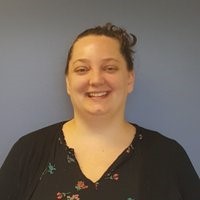
Julianne Jones
Water Leadership Institute | Water Environment Federation
Julianne Jones manages most of WEF’s specialty conferences and works with volunteers to set the programs. She leads the conversion of conferences into virtual events with building the site, recording, video editing, and running the live event. She organizes and manages the Water Leadership Institute, working on setting the program and organizing logistics, as well as being the main contact for the participants.
Panelists:
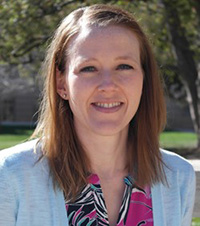
Amanda Hering
Professor | Baylor University, MoWaTER program
Professor Hering is a statistical modeler with problems requiring multivariate time series, spatial statistics, Markov-switching, clustering, and validation of primary interest. Much of her work is interdisciplinary with applications ranging from wind energy to water reuse to defense. Her current interests are in modeling big, multivariate, spatial datasets; developing methods for categorical spatial data; and detecting outliers and faults for process and data monitoring. Dr. Hering works with researchers whose data structures generate new statistical methodologies because either the goals or the size of the data presents a new challenge.
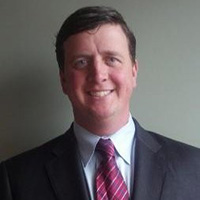
D. Andrew Ferguson
CEO | Argonaut
D. Andrew Ferguson and partner Douglas McConnell founded Argonaut (formerly known as PHASTAR) in the fall of 2010. In 2011, he was appointed as the organization’s first President and CEO. In this role, he has been responsible for the overall direction and operations of the organization. His vision and direction lead to the opening of the Davis Aerospace and Maritime High School in 2017.
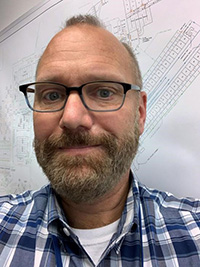
Nicholas Passarelli
Operator Apprenticeship Program | DC Water
Nick Passarelli has worked in the Environmental Field for over 30 years. He is a licensed Professional Engineer with a BS and MS in Civil/Environmental Engineering from George Washington University. Nick also has a Class IV ABC Wastewater Operator’s license. For almost the past 15 years he has worked at DC Water in the Process Engineering/Operations Group. Prior to working for DC Water, Nick worked in the consult engineering field for AECOM/Metcalf & Eddy as a consulting/design engineer.
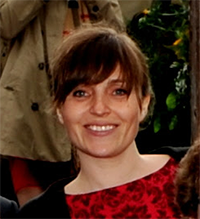
Laureline Josset
Associate Research Scientist | Columbia University Columbia Water Center/America’s Water Education (AWE) project
Laureline Josset is an Associate Research Scientist at the Columbia Water Center, where she works on the evaluation of water stresses through integrated assessments, the optimization of management strategy for water quantity and quality, and the transitions in the Food-Energy-Water nexus. Collaborating with actors from the government of New York State (NYSERDA) and the civil society (The Nature Conservancy), Laureline focuses on the quantification of risks due to uncertain climate and data to inform decisions. Before joining Columbia, she obtained a bachelor’s and master’s degree in Physics at the Swiss Federal Institute of Technology Lausanne (EPFL; Switzerland) and a PhD in Earth Sciences at the University of Lausanne (Switzerland). Laureline teaches for the Sustainable Management program classes on water system analysis and groundwater management, with a particular emphasis on conceptual modeling and system thinking.
Water Data Forum
Smart Stormwater: Data-Driven Response to Flooding, Erosion, and other Natural Hazards
July 28, 2022 | 3:00–4:00 p.m. CT
Presented by the Cleveland Water Alliance (CWA), Midwest Big Data Innovation Hub (MBDH), and Water Environment Federation (WEF)
The July webinar presents a conversation on stormwater data in the context of natural hazards. A curated panel discussion with subject experts from utilities and academia will be followed by Q&A.
Participants can expect to learn:
- 1. The importance of data in managing stormwater.
- 2. How data-related initiatives are driving research and practice in stormwater.
- 3. Some emerging trends or challenges of stormwater management that have societal impacts.
Moderator:
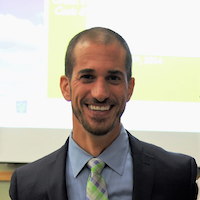
John Bilotta
Leader of the Minnesota Stormwater Research and Technology Transfer Program | University of Minnesota, Water Resources Center
John Bilotta is a Research Project Specialist with the University of Minnesota Water Resources Center, where he leads the Minnesota Stormwater Research and Technology Transfer Program, including leading the Minnesota Stormwater Research Council. His efforts focus on leading and coordinating a comprehensive research portfolio of projects that seek answers to questions around urban stormwater management practices and policies. John is also affiliated with the Minnesota Sea Grant Program, co-leading the Watershed Game Program, an interactive, educational tool that helps individuals understand the connection between land use and water quality. He also co-leads the Sea Grant Green Infrastructure and Stormwater Community of Practice.
Panelists:
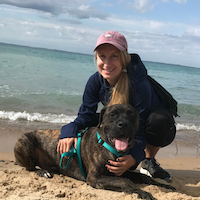
Donna Friedman
Watershed Team Leader | Northeast Ohio Regional Sewer District
Donna Friedman is a native Clevelander with 10 years of experience in the water sector. Currently, she serves as a Watershed Team Leader for the Northeast Ohio Regional Sewer District where she coordinates stream and sewer projects and manages community relations for 15 communities in the Cuyahoga River and Rocky River watersheds. Prior to this role, Donna conducted environmental monitoring assessments, worked in hazmat response, and collected water quality samples to ensure permit compliance. Donna has a master’s degree in Sustainable Natural Resources from Oregon State University and a bachelor’s degree in Biology from Loyola University Chicago.
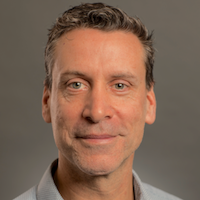
Joseph Wartman
Professor of Civil & Environmental Engineering, and Director of Natural Hazard and Disaster Reconnaissance (RAPID) Facility | University of Washington
Joe Wartman directs the Natural Hazards Reconnaissance (RAPID) Facility headquartered at the University of Washington, where he is a Professor of Civil and Environmental Engineering. He specializes in disaster risk reduction with a specific interest in geologic hazards and their impacts on communities. He has authored over 100 professional articles on natural hazards as well as essays and op-eds that have appeared in the New York Times, the Seattle Times, and EOS, among other popular media venues.
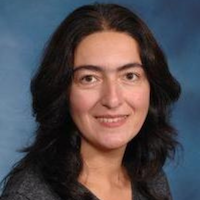
Lilit Yeghiazarian
Professor of Environmental Engineering & Science, and Lead PI, NSF Urban Flooding Open Knowledge Network | University of Cincinnati
Lilit holds her PhD from Cornell University Department of Agricultural and Biological Engineering, her MS in Industrial Engineering from the American University of Armenia Yerevan, and her BS in Technical Cybernetics Subdivision, Faculty of Systems and Control from the Yerevan Polytechnic Institute Yerevan. Her research and practice interests include Multifunctional Advanced Materials and Environmental Sensing, Porous Media, and Watershed Processes and Environmental Sustainability.
Water Data Forum
People, Process, and Technology for Understanding the Value-Based Path to Improved Performance
May 31, 2022 | 12:00–1:00 p.m. CT
Presented by the Cleveland Water Alliance (CWA), Midwest Big Data Innovation Hub (MBDH), and Water Environment Federation (WEF)
The Water Environment Federation leads a conversation on “People, Process, and Technology for Understanding the Value-Based Path to Improved Performance.” Smart solutions are changing the landscape of utilities. With these advancements, organizations must understand the variables involved in delivering expected returns on technology investments. This virtual panel discussion brings together experts in the field to provide insights and feedback on the following questions:
- 1. What are the major considerations in utility investments in technology?
- 2. What is dark data and how can improved technology performance bring this data to the forefront for use?
- 3. How are IT projects best prioritized—through CIP planning and delivery business process or through other operational business processes within utilities?
- 4. What impact might Water Intrapreneurship for Sustainable Enterprises (WISE) technology and data management approaches have on utility workforces?
- 5. What are the common datasets of utilities—asset management, operational optimization, customer engagement, IoT-related, and shared services?
Moderator:

Elkin Hernandez
Director, Maintenance Services | DC Water
Chair, Intelligent Water Technology Committee | WEF
Mr. Elkin Hernandez currently serves as DC Water Director of Maintenance Services, in this role, he oversees the maintenance of the over 40,000 assets used at Blue Plains Advanced Wastewater Treatment Plant (AWTP). He has over 20 years of experience in the design, construction, commissioning, and maintenance of water treatment and power utilities. For the past 9 years, he has worked at DC Water Blue Plains AWTP. Prior to joining DC Water, he worked in the consulting and construction engineering fields as a design, development, and commissioning engineer and manager.
Mr. Hernandez is the immediate past Chair of the WEF Intelligent Water Technology Committee. His background includes work on telecom cation, automation, process control, and cybersecurity. Currently, his work is focused in the fields of smart water, management, and maintenance optimization. Mr. Hernandez holds a bachelor and a master of engineering degree in Electrical and Computer Science.
Panelists:

Zdenko (Cello) Vitasovic, PhD, PE
Principal Investigator | WRF 4806 Project (UAIM)
Cello’s previously held roles and recognitions include Co-Principal Investigator, WRF Project 5039 (Smart Utilities and Intelligent Water Systems), Chair of WEF Intelligent Water Systems Committee, Recipient of the WEF Harrison Prescott Eddy Medal for outstanding Research (1998), and Project Team Lead on the WEF WISE Program. His focus has been on mathematical modeling, operational technology and real time controls, and information systems. He has executed a number of projects for water sector utilities in North America, UK, China, Hong Kong, Singapore, and Australia.
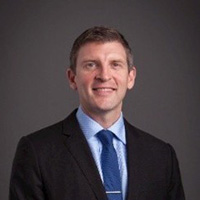
Scott Parker
Asset Manager | KC Water
Scott has over 20 years of experience in local government, utility management, and private consulting. He serves as the Asset Manager for KC Water in Kansas City, Missouri. Before KC Water, he served as the Assistant Director for Public Works in both Olathe and Lenexa, Kansas, where he led the finance, data management, solid waste, field operations (streets, utilities, traffic), and communications divisions, and managed multiple Police, Parks, and Fire Department capital projects. He also has private consultant experience providing capital planning, financial analysis, data system, asset management, and interim-executive services to Ft. Smith, Arkansas; Jackson, Mississippi; and Kansas City, Kansas, all of whom had signed Federal Consent Decrees with the Environmental Protection Agency (EPA).
Water Data Forum
Innovations in Water Quality: The Real-Time Revolution
March 30, 2022 | 11:00 a.m.–12:00 p.m. CT
Presented by the Cleveland Water Alliance (CWA), Midwest Big Data Innovation Hub (MBDH), and Water Environment Federation (WEF)
This edition of Water Data Forum will convene industry, government, and research experts to explore the next generation of water quality sensing technologies. In a facilitated discussion, panelists will use specific case studies to examine the challenges posed by new, or more recently understood, sources of water pollution and the opportunities surrounding real-time networks and new sensing modalities.
Participants can expect to learn:
- 1. Which water quality threats are considered most pressing by managers?
- 2. What opportunities are developments in sensing technology enabling?
- 3. How can government and industry better support the transition to the next generation of water monitoring technologies?
Moderator:

Max Herzog
Program Manager | Cleveland Water Alliance
Max Herzog is an impact professional dedicated to engaging diverse stakeholders in the development of tools and strategies that drive community innovation and resilience at the regional level. He is currently working at the nexus of intelligent water systems, technology-led economic development and Great Lake management as a Program Manager with Cleveland Water Alliance. Max holds a BA degree from Oberlin College in Political Science and Environmental Studies.
Panelists:

Ting Lu
Business Practice Leader for Digital Solutions | Clean Water Services
Dr. Ting Lu is the Business Practice Leader for Digital Solutions at Clean Water Services in Hillsboro, Oregon. Ting leads and directs innovation of digital solutions and the implementation of data management, and IT, OT, and ET integration. Ting serves on the Utility Management Committee and Intelligent Water Technology Committee at WEF. Before joining Clean Water Services, Ting worked for the Metropolitan Sewer District of Greater Cincinnati and Black & Veatch, where she led the integrated planning effort and developed a quantitative and innovative water quality program with smart sensors and data analytics. Ting has authored over 100 papers and presentations nationally and internationally and coauthored several book chapters for the Water Environment Federation. She received her PhD at the University of Cincinnati.
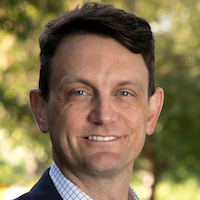
Adam Hobson
Hydrologist & Application Development Manager | In-Situ
Adam Hobson is Chief Hydrologist and Application Development Manager with In-Situ, a world-leading manufacturer of innovative environmental monitoring equipment and remote data collection and data management solutions. Over the past quarter century Adam has contributed to water monitoring projects on every continent and in most major water sources including lakes, rivers, wetlands, oceans, groundwater, snow and ice, soil, permafrost, and organisms. Adam develops and executes the strategic vision for water monitoring applications at In-Situ in collaboration with sales, marketing, and product management teams. He facilitates relationships with water monitoring agencies, industry, consulting and engineering firms, nonprofits, and universities from around the world to help them access the instrumentation, telemetry, software, and training they need to get the best data and make the best decisions Adam is a Registered Professional Geologist. He earned his bachelor’s degree in Earth & Environmental Science from Wesleyan University and his master’s degree in Civil Engineering with a Water Resources/Hydrology focus from the University of Colorado.
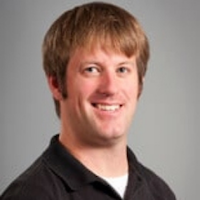
Ed Verhamme
Senior Project Engineer | LimnoTech
Ed is a Principal and Senior Engineer with LimnoTech and has been involved in dozens of Great Lakes and other large lake projects that push the limits of technology and innovative research and development. He oversees a network of buoys and sensors that support boaters, water treatment plant personnel, and many other operational users of large lake and river systems. He has been involved with hydrodynamic modeling and the application of water quality and nutrient models across the country since joining the firm in June 2005. Ed has also recently served as the president of the International Association for Great Lakes Research. Ed works at the LimnoTech Corporate Headquarters in Ann Arbor, Michigan.
Water Data Forum
Finger on the Pulse: Next-Generation Asset Health Monitoring for Smart Utilities
October 26, 2021 | 11:00 a.m.–12:00 p.m. CT
Presented by the Cleveland Water Alliance (CWA), Midwest Big Data Innovation Hub (MBDH), and Water Environment Federation (WEF)
The Water Environment Federation leads a conversation on Next-Generation Asset Health Monitoring for Smart Utilities. Smart solutions are changing the landscape of utilities. With these advancements, organizations must understand the variables involved in asset health monitoring. This virtual panel discussion brings together experts in the field to provide insights and feedback on the following questions:
- 1. What are the major considerations in utility asset health monitoring and O&M?
- 2. How can machine learning and artificial intelligence help?
- 3. How is this different than business intelligence dashboards?
- 4. What impact might AI approaches have on workforce?
- 5. What impact might AI approaches have on environmental sustainability?
Moderators:

Elkin Hernandez
Director of Maintenance Services | DC Water
Mr. Elkin Hernandez currently serves as DC Water Director of Maintenance Services, in this role, he oversees the maintenance of the over 40,000 assets used at Blue Plains Advanced Wastewater Treatment Plant (AWTP). He has over 20 years of experience in the design, construction, commissioning, and maintenance of water treatment and power utilities. For the past 8 years, he has worked at DC Water Blue Plains AWTP. Prior to joining DC Water, he worked in the consulting and construction engineering fields as a design, development, and commissioning engineer and manager. Mr. Hernandez is the current chair of the WEF Intelligent Water Technology Committee. His background includes work on telecom cation, automation, process control, and cybersecurity. Currently, his work is focused in the fields of smart water, management, and maintenance optimization. Mr. Hernandez holds a bachelor and a master of engineering degree in Electrical and Computer Science.
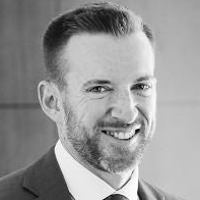
Jeremy Boren
Brand Manager | GrayMatter
Jeremy Boren has worked as a writer, editor, video producer, and podcaster for more than 18 years, both as a newspaper journalist and digital marketing professional. Jeremy earned a bachelor’s degree in Journalism from Ohio University and a master’s degree in Public Management from Carnegie Mellon University.
Panelists:

Nina Kshetry, PE
President | Ensaras, Inc.
Nina Kshetry is Founder and President of Ensaras, Inc., a company specializing in advanced analytics and artificial intelligence solutions for optimizing wastewater plant operations. Nina has over 15 years of wastewater treatment and engineering experience. She received her SB and SM degrees in Environmental Engineering, both from the Massachusetts Institute of Technology, and is a licensed Professional Engineer. She has a passion for advancing technology to help secure water for current and future generations.
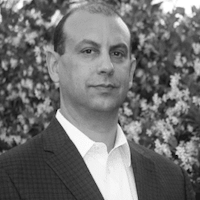
Kemell Kassim
Vice President of Digital Utilities | GrayMatter
Kemell has over 15 years of experience with GrayMatter and significant experience in water/wastewater, oil & gas, and power industries. Prior to joining GrayMatter, Kemell spent years as a successful consulting engineer in the water/wastewater market. He also worked on commissioning power generation plants with Babcock and Wilcox. Kemell specializes in asset health monitoring using machine learning and digital twins to deliver business results for utilities.
Water Data Forum
Open Watersheds: Innovations in Community Water Data
September 30, 2021 | 11:00 a.m.–12:00 p.m. CT
Presented by the Cleveland Water Alliance (CWA), Midwest Big Data Innovation Hub (MBDH), and Water Environment Federation (WEF)
This forum will convene industry, government, and community experts to explore the application of community science and open-source technology to local watershed management. In a facilitated discussion, the panelists will examine specific innovations in distributed sensing, volunteer monitoring, and data infrastructure to define a vision for the future of community surface water management.
Participants can expect to learn:
- 1. The exciting potential of open-source environmental monitoring.
- 2. Strategies to fuse innovation with community engagement for watershed management.
- 3. The role of community members in implementing solutions for local water quality.
Moderator:

Max Herzog
Program Manager | Cleveland Water Alliance
Max Herzog is an impact professional dedicated to engaging diverse stakeholders in the development of tools and strategies that drive community innovation and resilience at the regional level. He is currently working at the nexus of intelligent water systems, technology-led economic development and Great Lake management as a Program Manager with Cleveland Water Alliance. Max holds a BA degree from Oberlin College in Political Science and Environmental Studies.
Panelists:
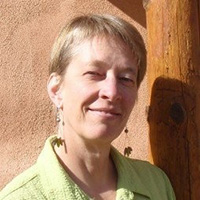
Barb Horn
Founder | Barb Horn LLC
Barb Horn recently retired from a 35-year career as a Water Resource Specialist for Colorado Parks and Wildlife where she helped design, launch, and run the Colorado River Watch Program. Now, as an expert facilitator and steering committee member of the Water Data Collaborative, Barb leverages her extensive teaching and facilitation experience to consult with community science groups to refine their technical skills, study designs, and data usage.

Brandon P. Wong
President & Co-Founder | Hyfi
Brandon P. Wong recently completed his PhD at the University of Michigan. He is a systems engineer with dual training in Electrical Engineering & Computer Science as well as Civil and Environmental Engineering. He led the development and deployment of the technologies behind Open-Storm.org, an open-source blueprint for smart water systems.

Mark App
Founder and Manager | Great Lakes Data Watershed
With the Great Lakes Data Watershed (GLDW), Mark App is finally putting his years of experience in software architecture to work for his lifelong passion—water quality. GLDW is a powerful web platform that allows scientists, educators, and community members to create interactive dashboards that provide insights into our critical water ecosystem.

Whitnye Long Jones
Founder and Executive Director | Organic Connects
Whitnye is a dynamic community and environmental steward with a genuine interest in youth engagement and social development. She applies a triple lens of social justice, environmental education, and outdoor adventure skills to Organic Connects’ diverse portfolio of extracurricular youth empowerment programs. This agile young nonprofit is using innovative and collaborative pedagogy to build the next generation of Black environmental leaders in Ohio.
Water Data Forum
Realizing Interoperable Water Data Across Sectors
August 11, 2021 | 12:00–1:00 p.m. CT
Presented by the Cleveland Water Alliance (CWA), Midwest Big Data Innovation Hub (MBDH), and Water Environment Federation (WEF)
This edition of Water Data Forum will convene industry, government, and research experts to explore the challenges and opportunities associated with data interoperability across different aspects of the water sector. In a facilitated discussion, the panelists will examine specific case studies and projects to define a vision and value proposition for the future of water data.
Participants can expect to learn:
- 1. How small things like data formats and database structure can have big impacts on the discoverability and usability of water data.
- 2. How federal, research, and other entities shape the conversation around water data.
- 3. The core values of truly interoperable water data and barriers to reaching this ideal.
Moderator:
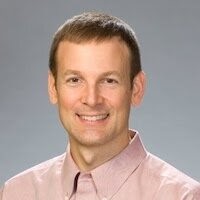
Anthony Aufdenkampe
Senior Environmental Scientist | LimnoTech
Anthony Aufdenkampe, PhD, is a Senior Environmental Scientist with more than 25 years of experience synthesizing biogeochemical, hydrological, geomorphic, and contaminant data, models, and knowledge over watersheds and estuaries. He has applied these skills to water quality assessment, water quality criteria development, biogeoscience basic research, and decision support for conservation implementation—often in complex partnerships with government agencies, conservation organizations, funding institutions, and other stakeholders.
Panelists:
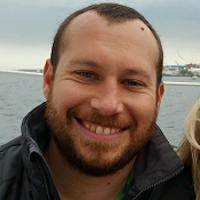
Anthony Castronova
Hydrologic Scientist | Consortium of Universities for the Advancement of Hydrologic Science, Inc. (CUAHSI)
Anthony’s work emphasizes the synergy between hydrologic data and modeling applications, with a particular focus on integrated modeling solutions. The overall aim of his research is to advance our ability to make accurate environmental management and policy decisions. In doing so, he has demonstrated the ability to design and develop software models, assimilate observation data, couple independent hydrologic models, as well as design and apply large-scale GIS algorithms.

Dwane Young
Chief of Water Data Integration Branch | EPA Office of Water
Dwane Young is in the Office of Water at the EPA and leads data integration activities for the Office. He has worked on environmental data management systems for the last twenty years, including: WQX, ATTAINS, RCRAInfo, and sensor interoperability. He has a degree in Fisheries and Wildlife Management from Utah State University.
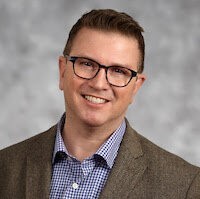
Peter Colohan
Executive Director of the Internet of Water | Duke University
Peter Colohan is the Executive Director of the Internet of Water (IoW), a project based at the Duke University Nicholas Institute for Environmental Policy Solutions. Peter came to the IoW after nearly a decade of Federal service with the National Oceanic and Atmospheric Administration (NOAA). At NOAA, Peter was instrumental in creating the NOAA Water Initiative and he also served as a Federal Coordinating Lead Author for the Water Chapter of the Fourth National Climate Assessment, published in November 2018. From 2012–2014, Peter served as the Assistant Director for Environmental Information within the White House Office of Science and Technology Policy under President Barack Obama.
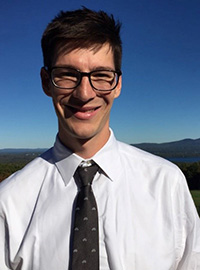
R. John Dawes
Founder & Executive Director | Chesapeake Commons
John is currently the lead for project strategy, with a focus on system design and product development, for Chesapeake Commons. Originating as a small fiscally sponsored program delivering GIS services and information design to environmentally focused organizations, John grew the Commons into a stand-alone nonprofit organization that delivers leveraged products and digital services to organizations working to improve water quality. Prior to founding the Commons, John worked at Environmental Integrity Project as a Research Analyst, mapping public and private drinking water wells and their proximity to hazardous coal ash impoundments. John graduated from Juniata College with a BA in Environmental Policy and holds an MS in Geographic Information Systems (GIS) from Johns Hopkins University. He is a self-taught front-end software developer and is passionate about all outdoor activities.
Water Data Forum
Managing Your Pipes: Data-Driven Distribution Network Optimization
July 22, 2021 | 12:00–1:00 p.m. CT
Presented by the Cleveland Water Alliance (CWA), Midwest Big Data Innovation Hub (MBDH), and Water Environment Federation (WEF)
The Water Environment Federation leads a conversation on Managing Your Pipes: Data-Driven Distribution Network Optimization. Efficiency and optimization for utilities saves money. Data-driven solutions are changing the landscape of utilities. With these advancements, organizations must understand the variables involved in order to achieve maximum return, which leads to the question: what are the most promising solutions in data-driven network optimization? This virtual panel discussion brings together experts in the field to provide insights on data-driven distribution optimization and the efforts to advance the application of new approaches.
Moderator:

Elkin Hernandez
Director, Maintenance Services | DC Water
Chair, Intelligent Water Technology Committee | WEF
Mr. Elkin Hernandez currently serves as DC Water Director of Maintenance Services. In this role, he oversees the maintenance of the over 40,000 assets used at Blue Plains Advanced Wastewater Treatment Plant (AWTP). He has over 20 years of experience in the design, construction, commissioning, and maintenance of water treatment and power utilities. For the past 8 years, he has worked at DC Water Blue Plains AWTP. Prior to joining DC Water, he worked in the consulting and construction engineering fields as a design, development, and commissioning engineer and manager.
Mr. Hernandez is the current chair of the WEF Intelligent Water Technology Committee. His background includes work on telecom cation, automation, process control, and cybersecurity. Currently, his work is focused in the fields of smart water, management, and maintenance optimization. Mr. Hernandez holds a bachelor and a master of engineering degree in Electrical and Computer Science.
Panelists:
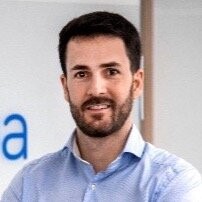
Pablo Calabuig
CEO North America | GoAigua, Inc.
Pablo Calabuig is the CEO of GoAigua, Inc., the US subsidiary of the Spain-based smart water company that is transforming utilities into more intelligent, more proactive and more resilient organizations. He graduated in Civil and Environmental Engineering from the University of Valencia and UC Berkeley. After working in the city of Valencia’s water utility, he joined the global consultancy firm McKinsey & Company, leading the digital transformation, IoT, and telecommunications practices across the USA and Latin America. Since 2019, he has been leading GoAigua’s digital expansion in North America.
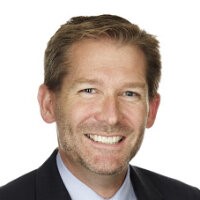
Tim J. Sutherns, M.Eng., P.Eng., P.E.
Board Chair and CIO | Eramosa Engineering, Inc.
Tim is the co-founder, board chair, and current CIO of Eramosa—a consulting engineering firm working with municipal partners across North America to provide technology solutions. These include process control and automation, system integration, asset management, data management, IoT, IT, network, electrical, and control systems. Tim was part of the team that built eRIS—a data management, analytics, and visualization tool for the water industry, which was recently sold. As part of our portfolio we also have an interest in Digital Water Solutions—a smart water technology that detects leaks and bursts, and monitors pressure, transient pressure, and water temperature in your water distribution system.
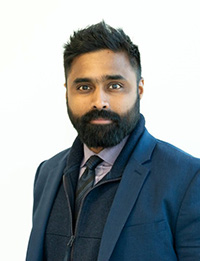
Prabhushankar Chandrasekeran, P.E.
Senior Principal | Stantec
Prabhu is the North America Practice Leader for Stantec’s Digital Transformation and Smart Utility services to their clients. Prabhu assists water utilities in their One Water journey through the implementation of a comprehensive Digital Strategy to enhance utility performance and enterprise excellence through integration of various initiatives such as asset performance management, operational optimization, energy management, customer engagement, and automated workforce training.
Water Data Forum
Innovations in Remote Sensing for Water Quality
June 29, 2021 | 1:00–2:00 p.m. CT
Presented by the Cleveland Water Alliance (CWA), Midwest Big Data Innovation Hub (MBDH), and Water Environment Federation (WEF)
Advances in remote sensing technologies and big data processing have vastly accelerated the potential to detect and monitor changes in aquatic ecosystems. Near-real-time monitoring today is used to assist in early-warning systems for risks to water resources, including harmful algal blooms and other water quality problems. These technologies allow us to detect and understand impacts to aquatic ecosystems from land use change, climate, and other factors. Yet, there is much work to do, as data about the environment and life in aquatic habitats may be difficult to collect or find in standardized formats, and many critical data remain to be shared openly.
This forum brings together researchers and scientists from across the United States to share perspectives on their work in using remote sensing to detect water quality changes and their impact on life, including ours, in lakes, oceans, and wetlands. This interactive discussion will inform participants about why water quality monitoring is important in the context of biology, ecology, and societal benefit, and about the current state of remote sensing for water quality, current challenges, and future opportunities.
Participants will learn about:
- 1. Near real-time monitoring of lake water quality.
- 2. Potential for remote sensing as early warning detection for water hazards.
- 3. The need for common and easily used tools for monitoring and assessments of water quality and aquatic biodiversity.
- 4. Linkages to societal benefit, sustainable development, and conservation.
Moderator:
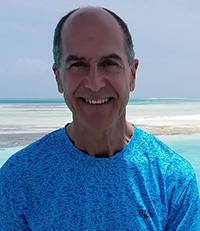
Dr. Frank E. Muller-Karger
Dr. Frank E. Muller-Karger is a biological oceanographer who conducts research on marine primary production and biodiversity by combining traditional oceanographic methods, satellite remote sensing, and large data sets. He has fostered significant international collaborations to better understand life in the sea, and co-chairs the Marine Biodiversity Observation Network, or MBON. Frank was a member of the U.S. Commission on Ocean Policy appointed by President George W. Bush, and has served as a member of the National Research Council Ocean Studies Board and on several NASA Science Teams and Planning Committees. He has received awards from the U.S. Environmental Protection Agency, NASA, the U.S. National Ocean Partnership Program, and the U.S. Congress. Frank has authored or coauthored over 200 scientific publications. He is of Hispanic descent and speaks fluent Spanish and German.
Panelists:
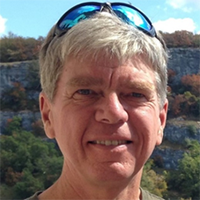
Dr. Steven Greb
Dr. Steven Greb is the current director of GEO AquaWatch, the GEO Water Quality Initiative. He is also a research scientist and honorary fellow at the University of Wisconsin–Madison Space Science and Engineering in Madison, Wisconsin. He previously worked for 30 years in the Water Resources Bureau of the State Department of Natural Resources. His work interests include satellite remote sensing applications for inland and coastal water quality, optical properties of inland lakes, thermal pollution in the urban environment, impact of climate change on hydrologic regimes and lake carbon dynamics, and interactions between hydrologic dynamics and water quality. He is a past member of the International Ocean Color Coordinating Group (IOCCG), Wisconsin Climate Change Initiative, and Lake Michigan Monitoring Coordination Council. He currently serves on the editorial board of the Journal of Remote Sensing.
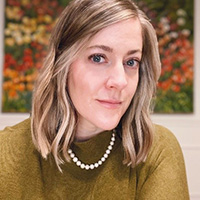
Dr. Kate Fickas
Dr. Kate Fickas is a remote sensing aquatic ecologist with the Utah Department of Environmental Protection and Research Faculty at Utah State University. In her roles as the program manager for both the Harmful Algal Bloom and Remote Sensing Programs, she uses earth observation technologies and in situ laboratory data to help state and local health departments make rapid decisions to protect public health related to water quality. In this role, she also acts as the UDEQ liaison to State public university research, serving as a board member of the Utah State College of Engineering and guiding graduate student research in developing novel remote sensing technologies and applications for use in both planktonic and benthic harmful algal blooms. Kate also works with federal partner agencies, such as NASA, NOAA, and EPA, to collect research and validation data for national remote sensing projects and products. Collaborating with other experts on the emerging water quality public health risk of benthic cyanobacteria blooms, she currently serves as a Team Leader on the Interstate Technology & Regulatory Council Benthic Harmful Cyanobacteria Bloom project. Prior to joining UDEQ, Kate completed a postdoctoral fellowship at the University of Massachusetts, Amherst, using drones to capture coastal wetland change and earned her PhD and MS degree at Oregon State University studying spatiotemporal dynamics of aquatic ecosystems with Landsat and UAS data.
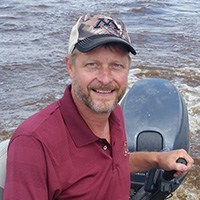
Dr. Leif Olmanson
Dr. Leif Olmanson is a Researcher at the University of Minnesota with over 20 years’ experience developing remote-sensing applications to create temporally and spatially rigorous datasets of water and land resources for large area ecosystem characterization. He is particularly interested in developing field-validated image-processing methods implemented in automated geospatial analysis systems, such as Google’s Earth Engine and Minnesota Supercomputing Institute’s supercomputers, to gain a better understanding of the natural environment. He currently leads a team of researchers and computer scientists to build a near-real-time water quality monitoring system for Minnesota’s >10,000 lakes using satellite imagery to providing critical water quality information for lake management.
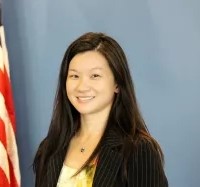
Dr. Christine Lee
Dr. Christine Lee is a Scientist in the Water and Ecosystems Group at the NASA Jet Propulsion Laboratory (JPL). Her research focuses on applications of remote sensing to water quality, water resources, and ecosystems management, using a multisensor approach. Christine Lee joined JPL in 2014 after working for two years at NASA Headquarters in the Applied Sciences Program through the American Association for the Advancement of Science (AAAS) Science and Technology Fellowship Program.
Water Data Forum
Driving Digital Security Across the Water Sector
May 12, 2021 | 12:00–2:00 p.m. CT
Presented by the Cleveland Water Alliance (CWA), Midwest Big Data Innovation Hub (MBDH), and Water Environment Federation (WEF)
The Water Environment Federation leads a conversation on Driving Digital Security across the Water Sector. From monitoring to response, from development to efficient operation and management, IoT and intelligent water solutions are changing the landscape of utilities. With these advancements, organizations must be hyperfocused on cyber threats that can impede the operations of organizations, which leads to the question of how secure is secure? What can we learn about cybersecurity from interdependent sectors, such as energy? What can we learn from intrusion case studies in the Water and Wastewater Systems sector? This virtual panel discussion brings together experts in the field to provide insights on cybersecurity and the ongoing efforts at the national level aimed at improving preparedness in the sector against the real risks posed by cyber intrusion.
Moderator:

Elkin Hernandez
Director, Maintenance Services | DC Water
Chair, Intelligent Water Technology Committee | WEF
Mr. Elkin Hernandez currently serves as DC Water Director of Maintenance Services. In this role, he oversees the maintenance of the over 40,000 assets used at Blue Plains Advanced Wastewater Treatment Plant (AWTP). He has over 20 years of experience in the design, construction, commissioning, and maintenance of water treatment and power utilities. For the past 8 years, he has worked at DC Water Blue Plains AWTP. Prior to joining DC Water, he worked in the consulting and construction engineering fields as a design, development, and commissioning engineer and manager.
Mr. Hernandez is the current chair of the WEF Intelligent Water Technology Committee. His background includes work on telecom cation, automation, process control, and cybersecurity. Currently, his work is focused in the fields of smart water, management, and maintenance optimization. Mr. Hernandez holds a bachelor and a master of engineering degree in Electrical and Computer Science.
Panelists:
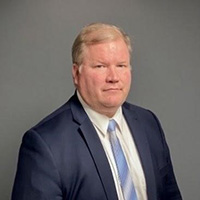
Mark Montgomery
Executive Director | Cyberspace Solarium Commission
Mark Montgomery serves as the Executive Director of the Cyberspace Solarium Commission. He most recently served as Policy Director for the Senate Armed Services Committee under the leadership of Senator John S. McCain. In this position, he coordinated policy efforts on national defense strategy, capabilities, and requirements; defense policy; and cyber issues. Mark served for 32 years in the U.S. Navy as a nuclear trained surface warfare officer, retiring as a Rear Admiral in 2017. His flag officer assignments included Director of Operations (J3) at U.S. Pacific Command; Commander of Carrier Strike Group 5 embarked on the USS George Washington stationed in Japan; and Deputy Director, Plans, Policy and Strategy (J5) at U.S. European Command. He was selected as a White House Fellow and assigned to the National Security Council, serving as Director for Transnational Threats from 1998–2000. Mark graduated from the University of Pennsylvania with bachelor’s and master’s degrees in History. He subsequently earned a master’s degree in History from Oxford University, and completed the U.S. Navy Nuclear Power Training Program.
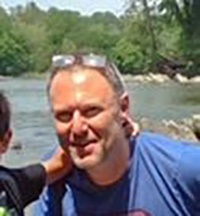
David Travers
Director, Water Security Division | U.S. Environmental Protection Agency
David Travers serves as the Director of the U.S. EPA Water Security Division, which has the mission of enhancing the security and resilience of the nation’s drinking water and wastewater systems against all hazards—from natural disasters to malevolent acts—through tools, training, and technical assistance. David has been with the EPA for over 20 years. Prior to joining EPA, David received a PhD in Environmental Engineering/Sciences and a Master of Public Health degree from the University of Michigan, and a bachelor’s degree in History from The University of Chicago.
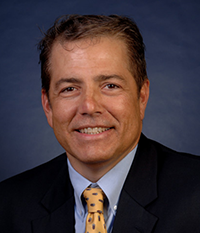
Jim McCarthy
Federal Lead: Energy Sector Cybersecurity, National Cybersecurity Center of Excellence | National Institute of Standards and Technology
Jim McCarthy is a Senior Security Engineer at the National Institute of Standards and Technology National Cybersecurity Center of Excellence (NCCoE). He currently serves as the lead for NCCoE energy-sector projects, where his work focuses on security data analytics, secure architecture for power delivery systems, IT/OT asset management, and situational awareness for the electric sector. Prior to joining the NCCoE, Mr. McCarthy worked in various cybersecurity roles at the U.S. Nuclear Regulatory Commission and the U.S. Department of Transportation, where he managed cybersecurity incident response teams and conducted security assessments on components of the nation’s critical infrastructure systems.
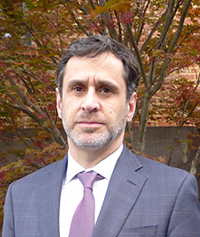
Michael Arceneaux
Managing Director | WaterISAC
Michael Arceneaux has worked in the water sector since 1995. He is currently the Managing Director of the Water Information Sharing and Analysis Center (WaterISAC) as well as the Chief Operating Officer of the Association of Metropolitan Water Agencies. Michael and his team deliver a steady flow of actionable and practical resources to its water and wastewater utility members and other water sector and government professionals. Prior to joining the water sector, Michael worked for former U.S. Sen. John Breaux and served as an intelligence specialist in the U.S. Navy.
Water Data Forum
Cultivating Regional Resilience: Water, Data, and Climate Challenges at Scale
April 20, 2021 | 11:00 a.m.–12:00 p.m. CT
Presented by the Cleveland Water Alliance (CWA), Midwest Big Data Innovation Hub (MBDH), and Water Environment Federation (WEF)
The Midwest Big Data Innovation Hub will lead a conversation on “Cultivating Regional Resilience: Water, Data, and Climate Challenges at Scale.” This discussion will explore how water data are used to address issues associated with climate and land use across broad geographic scales. A curated panel discussion with subject matter expertise professionals will be followed by Q&A.
Moderator:
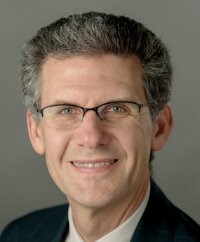
Dr. Derek Kauneckis
Affiliated Associate Research Faculty, Division of Earth and Ecosystem Sciences | Desert Research Institute
Dr. Kauneckis is Associate Research Faculty in the Division of Earth and Ecosystem Sciences at the Desert Research Institute. He holds of PhD in Public Policy from Indiana University, Bloomington, and an MS degree from the University of California, Davis. His research focuses on regional environmental governance and the emergence of cooperative institutions. Dr. Kauneckis currently teaches courses on “Resilience Theory and Practice” and “Environmental Sustainability Assessment.” He has examined behavioral and institutional components of resilience planning, local climate policy networks, and the role of technology in the management of natural systems. His research has been published in the Journal of Coastal Management, Simulation & Gaming, Environmental Management, Studies in Comparative International Development, Journal of Water Resources Planning and Management, and Bulletin of the American Meteorological Society, among others. Dr. Kauneckis currently serves as an Advisory Committee Member for the Department of Homeland Security Resilient Investment Planning and Development Working Group (RIPDWG) and on the Advisory Group on Professional Education for the American Society of Adaptation Professionals (ASAP).
Panelists:
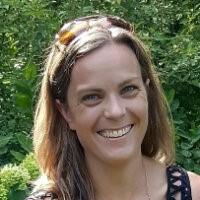
Dr. Grace Wilson
Postdoctoral Researcher, Dept. of Soil, Water, and Climate | University of Minnesota
Dr. Wilson received a Bachelor of Art in Biology degree from Macalester College, followed by an MS degree in Applied Plant Sciences and a PhD in Land and Atmospheric Sciences, both from the University of Minnesota. Her long-term research interests involve finding solutions to water quality issues, using tools that combine crop, soil, and water sciences. Her research and academic experiences have focused on using hydrologic and water quality models to study the impact of land-management and land-use decisions on nutrient pollution to local surface and groundwater. Her applied research experience with hydrologic and water quality models has focused on the effects of land-use and management scenarios on water quality.
In her PhD dissertation work and current postdoctoral research with Dr. David Mulla, she has used the field-scale model, DRAINMOD-NII, to examine changes in nitrogen lost through subsurface drainage from corn fields using fertilizer application based on monitoring of in-season crop nitrogen requirements compared with more traditional fertilizer-application methods. The results of model simulations were used in a regression analysis to develop equations that predicted regional nitrogen losses based on fertilizer application rate and timing, and regional climate.
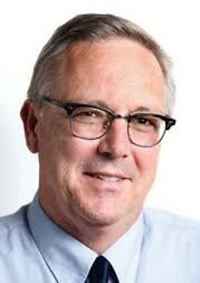
Dr. Chris Jones
Research Engineer at IHR-Hydroscience & Engineering | The University of Iowa
Dr. Chris Jones is a Research Engineer at IIHR-Hydroscience & Engineering at the University of Iowa, where he manages the university’s network of real-time water quality sensors deployed at 65 stream sites around the state of Iowa. His research interests include contaminant hydrology in agricultural landscapes, nutrient and sediment loss and transport, and municipal water supply. He holds a PhD in Analytical Chemistry from Montana State University, and previous work experience includes positions at Des Moines Water Works and the Iowa Soybean Association.
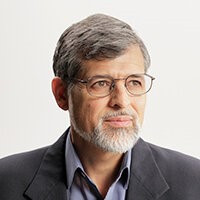
Dr. David Mulla
Larson Chair and Professor for Soil & Water Resources | University of Minnesota
Dr. David Mulla is the Larson Chair and Professor for Soil & Water Resources in the Department of Soil, Water, and Climate at the University of Minnesota. His research focuses on non-point source water quality pollution and applications of spatial statistics to agriculture and the environment.
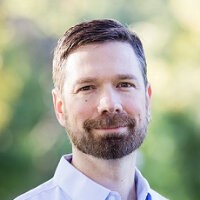
Dr. Brent Dalzell
Research Soil Scientist | USDA-ARS
Dr. Dalzell is a Research Soil Scientist with the USDA-ARS Soil and Water Management Research Unit located in St. Paul, Minnesota. Dr. Dalzell employs a range of model- and field-based approaches to work on issues related to protection and conservation of soil and water quality in agricultural landscapes. Brent’s current work is focused on quantifying field-scale export of water, sediment, and nutrients under different management scenarios as well as watershed-scale processes that can influence export to downstream water bodies.
Water Data Forum
Smart Water Equity: Big Data for Environmental Justice
March 15, 2021 | 12:00–1:00 p.m. CT
Presented by the Cleveland Water Alliance (CWA), Midwest Big Data Innovation Hub (MBDH), and Water Environment Federation (WEF)
This forum will convene industry and community experts to explore the application of water data tools to issues of water equity and environmental justice. In a facilitated discussion, the panelists will examine specific case studies and projects to define a vision for the impact and future of data in this space.
Participants can expect to learn:
- 1. How customer analytics can help reduce water shutoffs.
- 2. How existing city data can be used to find lead pipes.
- 3. How companies, utilities, and organizers leverage data in the fight for water equity.
Moderator:
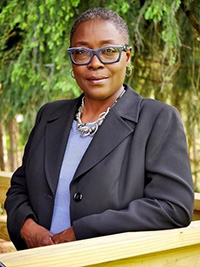
SeMia Bray
Managing Principal Consultant | Cray Consulting Group, Inc.
SeMia is a strategic business consultant and thought leader. With a passion for cross-sector knowledge exchange and facilitating real conversations, she engages leaders in innovative thinking. Over the past 20 years, she has provided consulting services in the private, manufacturing, and nonprofit sectors. A veteran of the U.S. Army National Guard, SeMia honorably served our country for six years. SeMia is currently engaged in the nonprofit sector as the Local Director of Emerald Cities Cleveland. In this role, she actively participates in moving forward an agenda aimed at achieving a successful transition to a sustainable, resilient, prosperous and equitable economy driven by safe, renewable energy. Prior to Emerald Cities, SeMia was actively engaged in the social justice community as Director of Institutional Advancement at the Urban League of Greater Cleveland. She holds a master’s degree in Organizational Systems Design from the Baldwin Wallace University (formerly Baldwin Wallace College), and a bachelor’s degree, with a dual major in Business Administration and Interior Design, from Ursuline College. She is also a graduate of Neighborhood Leadership Cleveland (Class 9) and the Northern Ohio Executive Leadership Institute. In 2016, SeMia was selected as a candidate for a national leadership program designed to further develop leaders across sectors and geographies.
Panelists:
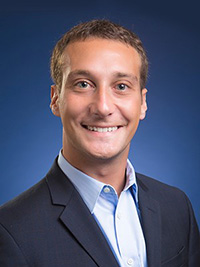
Eric Schwartz
Co-Founder | BlueConduit
Eric Schwartz is a co-founder of BlueConduit and a professor of marketing at the Ross School of Business at the University of Michigan. With over 10 years of experience in data science and predictive modeling, he is a pioneer in the realm of predicting customer behavior. Recently, his focus has been on applying his expertise in data science for public good, beginning with work on water quality and infrastructure issues related to remediation efforts in Flint, Michigan. His efforts have been recognized by many as the standard for identifying Lead Service Lines.
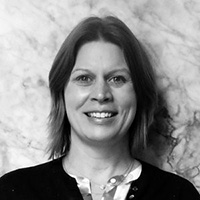
Dr. Christine Boyle
Vice President of Business Incubation | Xylem, Inc.
Dr. Christine Boyle is the Director of the Xylem Metering Insights Group. Her work focuses on developing decision-support software that achieves both resource and financial sustainability goals for water utilities. She received a doctorate in water resource planning in 2011 and “spun” a water analytics company, Valor Water, out of her thesis work at the University of North Carolina at Chapel Hill. She is Vice Chair of the Cal-Nevada American Water Works Association and a Trustee of the American Water Works Association Management and Leadership Division.
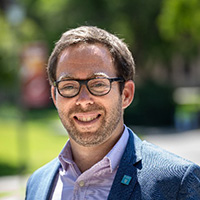
Greg Landel
CEO | CityTaps
Grégoire Landel is a Franco-American social entrepreneur and the founder of CityTaps. He is a feminist & a humanist. He studied engineering in the USA at Princeton, MIT, and Columbia University and worked in software in San Francisco and Kampala before moving to Paris in 2005, where he became an expert in the water/finance nexus in developing countries. This is how he developed his vision for CityTaps, which he launched in 2015.
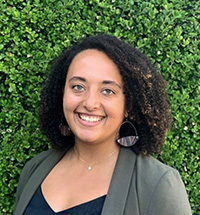
Letitia Carpenter
Program Manager | US Water Alliance
Letitia Carpenter is a Program Manager at the US Water Alliance, a national nonprofit organization advancing policies and programs that build a sustainable water future for all. She works on the Alliance’s Equitable Water Future programs, and has years of experience leveraging cross-sector partnerships and collaborative data practices to inform environmental justice initiatives. Before joining the Alliance, Letitia worked on community-centered data initiatives in both the nonprofit and public sectors to ensure equitable access to environmental and community benefits.
Water Data Forum
Data-Driven Asset Management: Efficiency and Risk Reduction for Smart Utilities
February 16, 2021 | 12:00–2:00 p.m. CT
Presented by the Cleveland Water Alliance (CWA), Midwest Big Data Innovation Hub (MBDH), and Water Environment Federation (WEF)
The Water Environment Federation leads a conversation on Data-Driven Asset Management—Efficiency and Risk Reduction for Smart Utilities. From monitoring to response, from development to efficient operation and management, IoT and intelligent water solutions are changing the landscape of utilities. This virtual panel discussion brings together experts in the field discuss the exciting advances and opportunities in data-driven asset management.
Moderator:

Elkin Hernandez
Director, Maintenance Services | DC Water
Chair, Intelligent Water Technology Committee | WEF
Mr. Elkin Hernandez currently serves as DC Water Director of Maintenance Services, in this role, he oversees the maintenance of the over 40,000 assets used at Blue Plains Advanced Wastewater Treatment Plant (AWTP). He has over 20 years of experience in the design, construction, commissioning, and maintenance of water treatment and power utilities. For the past 8 years, he has worked at DC Water Blue Plains AWTP. Prior to joining DC Water, he worked in the consulting and construction engineering fields as a design, development, and commissioning engineer and manager.
Mr. Hernandez is the current chair of the WEF Intelligent Water Technology Committee. His background includes work on telecom cation, automation, process control, and cybersecurity. Currently, his work is focused in the fields of smart water, management, and maintenance optimization. Mr. Hernandez holds a bachelor and a master of engineering degree in Electrical and Computer Science.
Panelists:
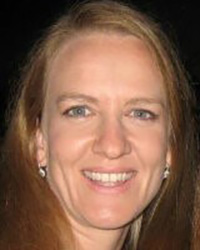
Theresa Bruton, CMRP, CRL
Manager, Asset Management | DC Water
Ms. Theresa Bruton is the manager of Asset Management at DC Water Blue Plains AWTP. Ms. Bruton has 20 years of experience in design, construction, commissioning, maintenance, and operations in the water and wastewater industry. She has a bachelor’s and master’s degree in Engineering, a Professional Engineer license in Maryland, and has focused the last 5 years on Asset Management and Reliability.
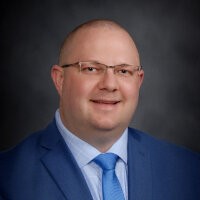
Jim Cooper
Associate Vice President and Global Leader for Intelligent Water | Arcadis
Mr. Cooper is an Associate Vice President at Arcadis and serves as their Global Leader for Intelligent Water. Jim earned an Executive Certificate in Artificial Intelligence: Implications for Business Strategy from MIT. He is a well-established industry thought leader, authoring more than 50 publications. Jim is also a Professional Engineer and serves in multiple leadership roles in organizations throughout the water sector.
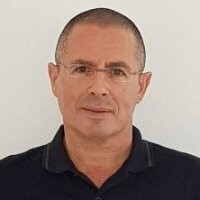
Guy Meiri
Head of Business Development | IOSight
Guy is a seasoned business development professional with over 20 years of diverse experience in strategy, business development, sales, and management. Guy worked for leading companies, including IBM, Deloitte, PwC, and Maccabi Healthcare, focusing on digital and data analytics innovation and programs. Guy joined IOSight in 2019 and leads business development and sales of the company’s water-specific data management and analytics solutions in global markets. At Deloitte, Guy managed global strategic accounts, led business development of the robotics & cognitive automation practice, and supported data analytics projects across various sectors. As Director of Business Development at Maccabi Healthcare, Guy focused on the development of business initiatives related to big-data and digital solutions. Guy previously managed the strategy consulting practice at IBM Israel and co-founded a cleantech startup, which focused on cleanup of environmental resources.

Dr. Sunil Sinha
Professor and Director, Sustainable Water Infrastructure Management (SWIM) Center | Virginia Tech
Dr. Sunil Sinha is a Professor of Civil and Environmental Engineering and Director of Sustainable Water Infrastructure Management (SWIM) Center of Excellence at Virginia Tech. Dr. Sunil Sinha is a National Science Foundation (NSF) Career Award recipient in the area of sustainable water infrastructure management systems.
Dr. Sinha’s research, teaching, and consulting activities are focused in the areas of infrastructure management, sustainability, pattern recognition, sensor informatics, and resilience, especially water systems. Dr. Sinha has documented and disseminated the results and findings from research in over 450 publications in referred journals, and reports.
Dr. Sinha was featured in a 90-minute PBS documentary titled “Liquid Assets: The Story of Our Water Infrastructure,” which throws light on a long-buried problem—America’s aging water system. He has given many NPR interviews and was featured as a water infrastructure expert in a History Channel documentary titled “The Crumbling of America.”

Tim Sutherns
Board Chair and CIO | Eramosa
Tim is the co-founder, board chair and current CIO of Eramosa—a consulting engineering firm working with municipal partners across North America to provide technology solutions. These include process control and automation, system integration, asset management, data management, IoT, IT, network, electrical, and control systems. Tim was part of the team that built eRIS—a data management, analytics, and visualization tool for the water industry, which was recently sold. As part of our portfolio we also have an interest in Digital Water Solutions—a smart water technology that detects leaks and bursts, and monitors pressure, transient pressure, and water temperature in your water distribution system.
Water Data Forum
Smart Water for the Smart Home
January 19, 2021 | 1:00–2:00 p.m. CT
Presented by the Cleveland Water Alliance (CWA), Midwest Big Data Innovation Hub (MBDH), and Water Environment Federation (WEF)
As smart technology becomes inextricable from every aspect of our modern lives, it’s no surprise that smart water tech would extend to the place we spend the most time: our homes. New advances in smart water technology can help everyday users monitor water use, detect leaks, reduce costs, and much more.
This forum convenes industry and utility experts to explore the application of high-frequency sensing, data analytics, and/or real-time control systems to in-home water systems. In a facilitated discussion, the panelists will examine specific case studies and projects and define a vision and value proposition for the future of smart water in the smart home.
Participants will learn about:
- 1. How the Internet of Things is transforming in-home plumbing.
- 2. The role of real-time metering in identifying leaks before they cause damage.
- 3. The core values of water in home life and how technology can amplify it.
Moderator:

Rebekah Eggers
Business Partnerships and Transformation Executive | IBM Global Markets
Rebekah has responsibility for the IBM Global Market Transformation Initiatives for Energy, Environment, & Utilities and is a trusted utility industry professional based in Los Angeles with a 20-year track record of strong solution leadership. She mobilizes the IBM global and partner ecosystem capabilities to create business value, leveraging experiences managing complex initiative design while operating in intense, results-focused environments. Rebekah is known for creating sustainable go-to-market and portfolio leadership for solutions that leverage data and analytics, improve operational efficiencies, and deliver customer satisfaction, ultimately enabling high-performance teams. Additionally, she is a member of the IBM Industry Academy, a vibrant community of IBM’s preeminent industry leaders, and a member of the Board of Directors for Woodard and Curran, a privately held integrated engineering, science, and operations company. She holds two Executive Advisory Board positions: Digital Water City, a European Union Horizon 2020 Project; and One Water Academy, a nonprofit focused on developing water professionals for a One Water Resilient World. She is on the Advisory Committee for program development at DistribuTech International and World Water Tech. Rebekah is sought out as a strategic advisor, keynote speaker, and for engaging dialogue at industry events across the globe.
Panelists:
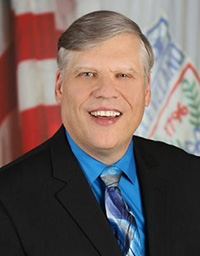
Alex Margevicius
Commissioner of Cleveland Water | City of Cleveland
Alex Margevicius began his career with Cleveland Water as a Civil Engineer in 1985 and was appointed the Assistant Commissioner of Engineering at Cleveland Water in 1995. Margevicius was responsible for coordinating all engineering and Capital Improvement Projects for the Division. A native Clevelander, Margevicius is an expert in the design and operation of large, complex water systems, and has significant insights into distribution system infrastructure issues. He is also an authority on power grid reliability for the water industry. He leads the design of Cleveland Water’s GIS and hydraulic model systems.
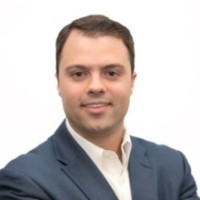
Mason Hall
Director of Marketing, Consumer Connected Channel | Fortune Brands Global Plumbing Group (Moen)
The Fortune Brands Global Plumbing Group (GPG) is a multi-brand, -channel. and -geography plumbing business. This segment manufactures, assembles, or distributes faucets, showers, accessories, tubs, sinks, garbage disposals, and sanitary ware in North America, China, New Zealand, South Africa, and Europe. The GPG is also expanding market share through several attractive growth engines, such as digital water. Moen, the number-one consumer faucet brand in North America with worldwide brand recognition, holds exclusive contracts with a significant share of the largest home builders and benefits from a flexible global supply chain.
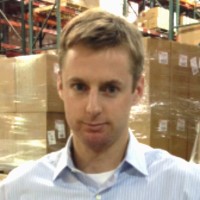
Blake Oatey
Director of Business Development | Oatey Company
Blake has been with Oatey Company since 2010, currently serving as Director of Business Development. In this role, he is responsible for executing on long-range growth opportunities, including strategic acquisitions and technology partnerships. In prior roles at Oatey, Blake has worked in product management and international sales. Prior to Oatey, Blake worked at Blue Point Capital Partners, a Cleveland-based private equity firm, and Morgan Joseph & Co., a middle-market investment bank. Blake holds a BA degree in Business Administration from Furman University.
